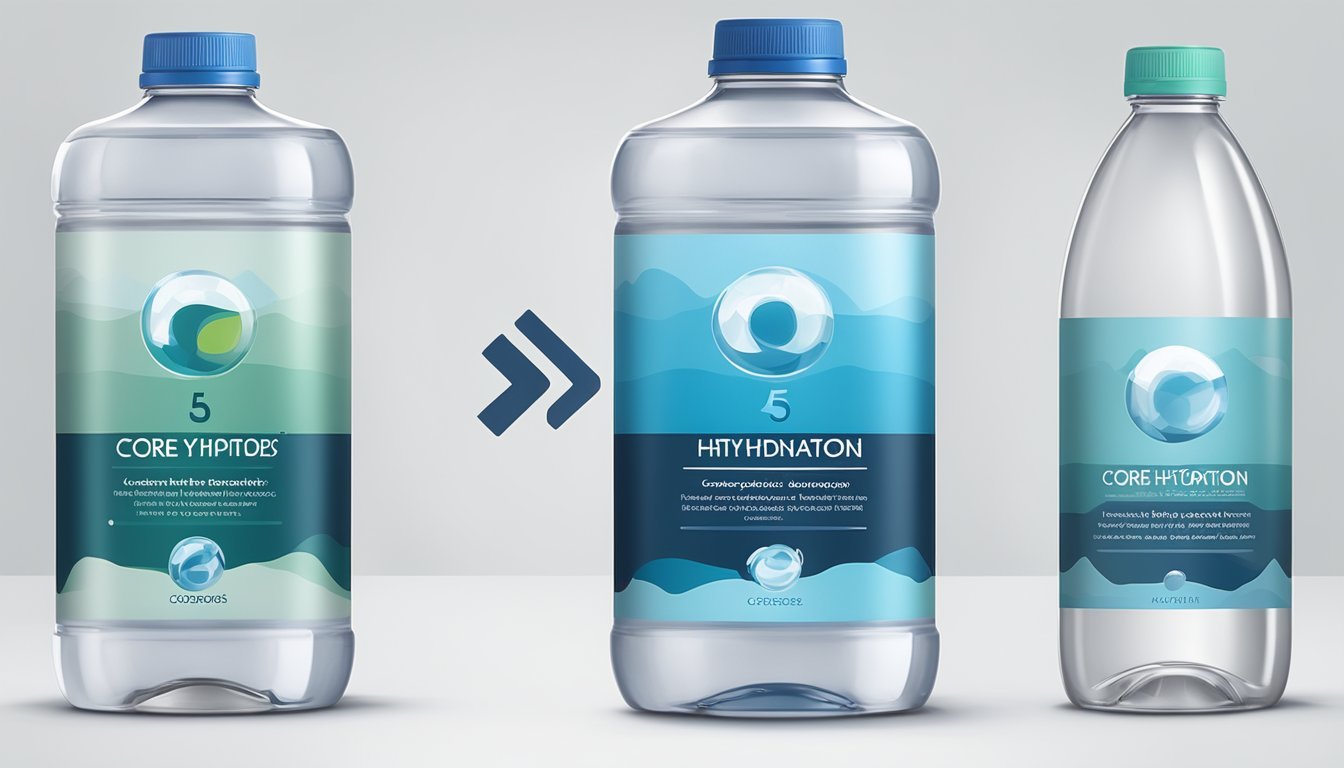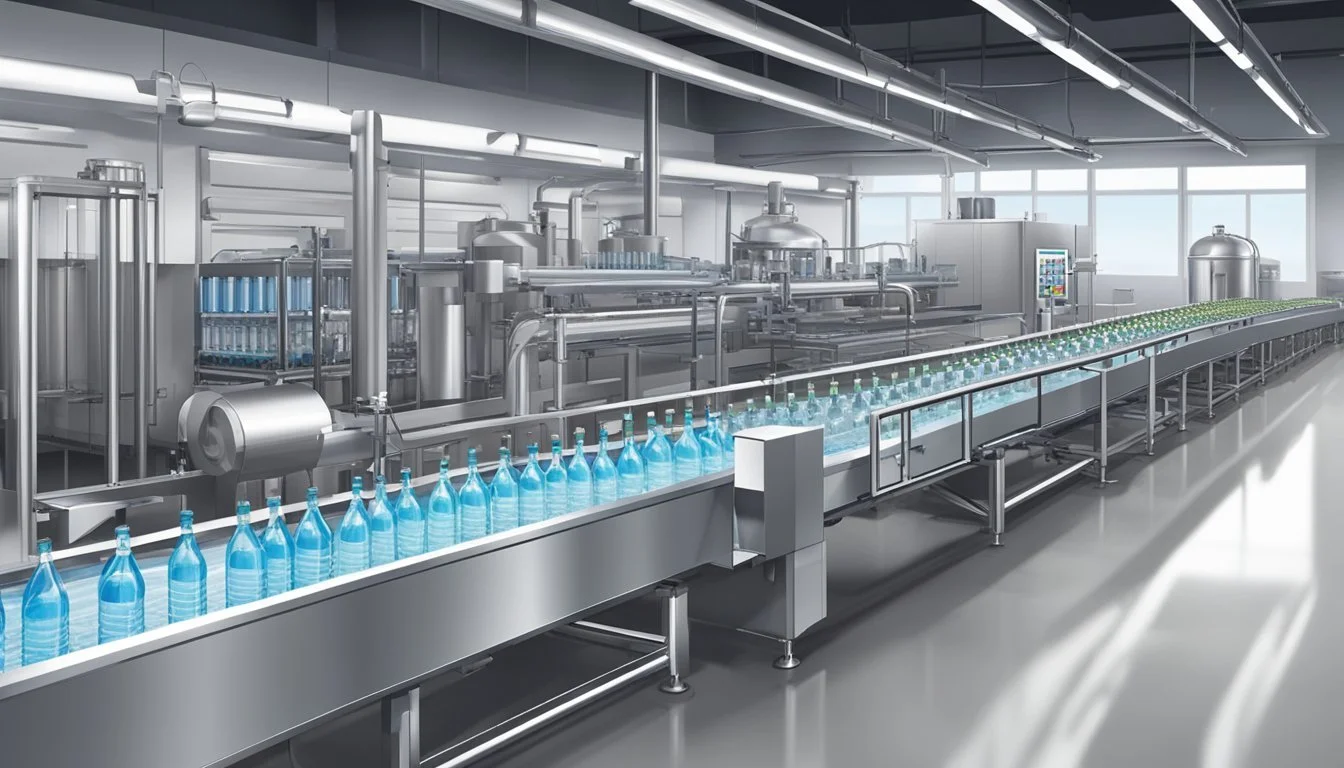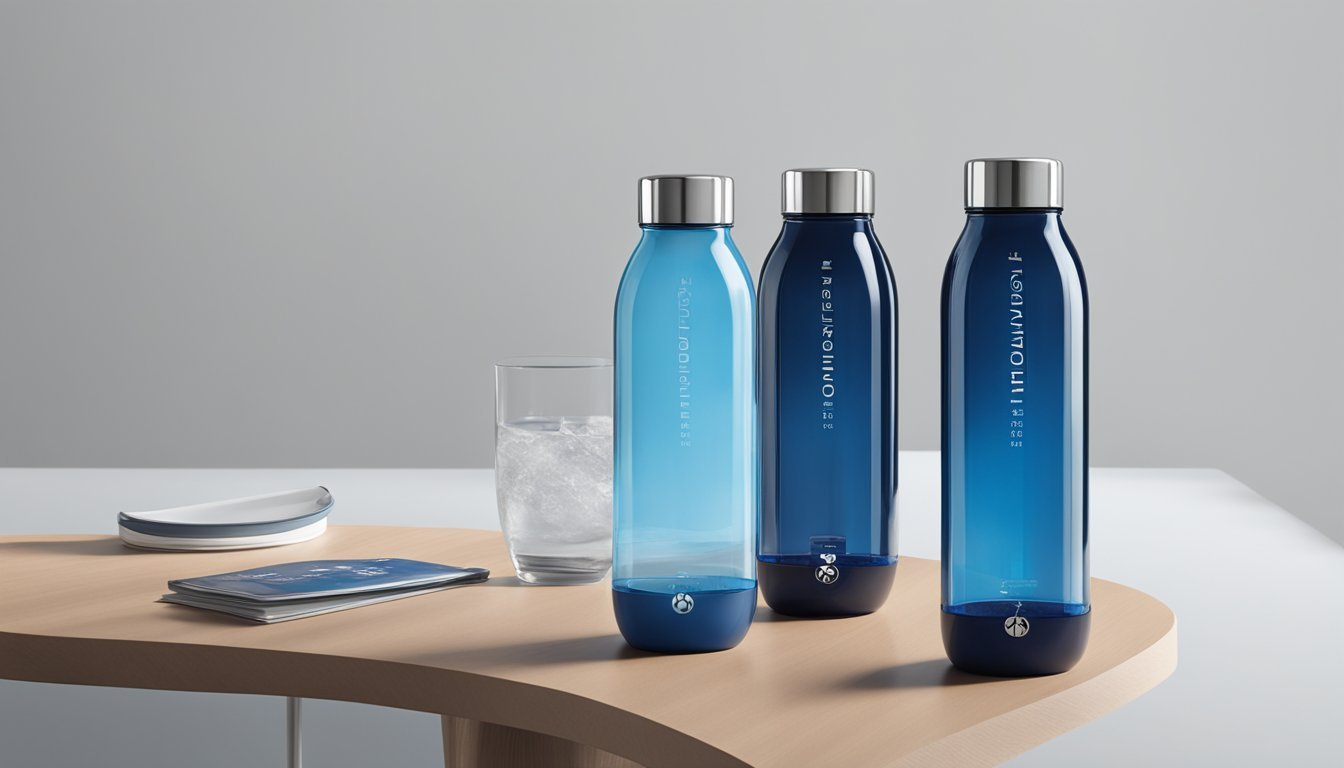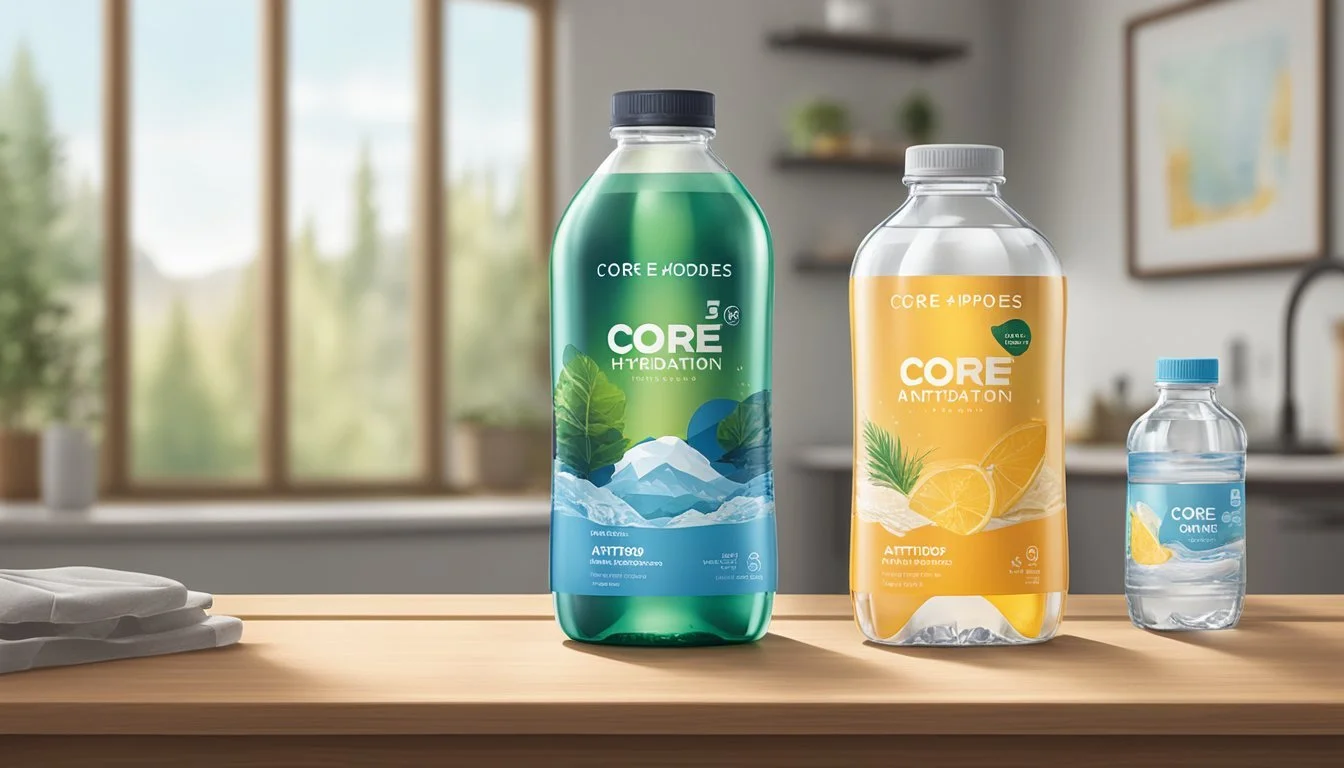Core Hydration vs. Antipodes
Bottled Water Showdown
Choosing the right bottled water can be a challenge, especially when comparing brands like Core Hydration and Antipodes. Core Hydration positions itself as a premium option with its ultra-purified water, boasting a pH that matches the human body's natural state. The 7-stage filtration process, which includes methods like reverse osmosis and ultraviolet treatment, ensures a high level of purity, free from fluoride.
On the other hand, Antipodes stands out with its naturally alkaline water sourced from a deep aquifer in New Zealand. The company emphasizes its water's natural purity and mineral content, which is untouched by industrial processes. For those seeking a bottled water with a natural origin and minimal processing, Antipodes may be the preferred choice.
When it comes to hydration and mineral content, both Core Hydration and Antipodes offer unique benefits that cater to different preferences and needs. Core Hydration provides added electrolytes and a balanced pH, making it suitable for individuals looking for scientifically adjusted purity. Meanwhile, Antipodes offers a purely natural option with a rich mineral profile, perfect for those who value natural sources.
Understanding Bottled Water
Bottled water varies significantly in terms of types, regulatory standards, and environmental impact. This section explores these aspects in detail to provide a comprehensive overview.
Types of Bottled Water
Bottled water can be categorized into several types, each with its own characteristics and benefits. Spring water originates from natural springs and is collected at the source. Mineral water contains specific minerals that are added or occur naturally. Purified water undergoes various purification processes such as distillation or reverse osmosis to remove impurities. There is also alkaline water, which has a higher pH level and is marketed for its potential health benefits. Understanding these distinctions helps in choosing the type that best suits individual needs.
Bottled Water Regulations
The safety and quality of bottled water are governed by regulations set forth by bodies like the FDA. In the United States, the FDA mandates that bottled water must meet the same safety standards as tap water. Bottled water is tested for contaminants such as pathogens, heavy metals, and chemical pollutants. Different types of bottled water must comply with specific labeling requirements to ensure transparency. For instance, mineral content must be disclosed on the label. These regulations ensure that consumers receive a safe and clearly labeled product.
Environmental Considerations
The environmental impact of bottled water is a significant concern. Single-use plastic bottles contribute to pollution and have a substantial carbon footprint. Despite being recyclable, many plastic bottles end up in landfills or oceans. Water brands are increasingly using BPA-free materials and promoting recycling. Nevertheless, the production and transportation of bottled water consume large amounts of energy and resources compared to tap water. Thus, consumers are encouraged to consider these environmental factors when choosing bottled water.
Hydration and Health Benefits
Both Core Hydration and Antipodes offer unique benefits when it comes to hydration and overall health, primarily driven by their different mineral compositions and pH levels.
Role of Electrolytes in Hydration
Core Hydration is enriched with electrolytes such as potassium, magnesium, and calcium. These minerals are crucial for maintaining the body's hydration levels.
They help regulate nerve and muscle function, balance pH levels, and maintain fluid balance within the body. The inclusion of electrolytes can lead to improved hydration, making Core Hydration a beneficial option for athletes or those engaging in strenuous activities.
Antipodes, while it may not advertise specialized electrolyte enhancement, naturally contains minerals due to its spring water source. Drinking water that contains natural ions can aid in general hydration. This includes maintaining muscle function and supporting bone health, though the exact mineral content can vary based on the source.
Comparative Health Advantages
Core Hydration features a pH level of 7.4, which is said to be in sync with the body’s natural pH balance. This neutrality can potentially benefit long-term health, contributing to optimal bodily function.
In contrast, Antipodes focuses on its purity and natural mineral content. The brand prides itself on sourcing water from natural springs, which can offer a crisp, refreshing taste along with essential minerals that support overall health.
Both brands avoid unhealthy additives such as sugars and artificial flavors, making them preferable choices for those conscious about their caloric and sugar intake.
Core Hydration's specific electrolyte enhancements make it a targeted choice for those needing to replenish minerals lost through sweat, while Antipodes's natural properties make it a reliable option for daily consumption.
Production and Purification Processes
Core Hydration and Antipodes use distinct methods for producing and purifying their bottled water. These variations impact the water's quality, taste, and appeal to consumers who prioritize health and purity.
Reverse Osmosis and Filtration
Core Hydration employs a rigorous seven-stage purification process designed to eliminate impurities and enhance water quality. This includes reverse osmosis, which effectively removes contaminants such as heavy metals, salts, and chemicals. Additionally, the water undergoes carbon filtration, ultraviolet light disinfection, and ozonation to ensure it meets high safety standards.
Antipodes, on the other hand, sources water from natural springs. While not overly processed, the water undergoes minimal filtration to preserve its natural minerals and achieve a natural pH balance. The spring water is filtered to remove any particulates or impurities that could affect taste or clarity.
Natural vs. Manufactured
Core Hydration's water is highly processed through advanced purification stages to achieve a clean, crisp taste. The company adds electrolytes and balances the water's pH to an optimal level, which may involve adding minerals or other substances. This approach appeals to those who prefer water with a consistent and scientifically engineered profile.
In contrast, Antipodes prides itself on its natural spring water, which is collected and bottled with minimal alteration. The natural mineral content and the inherent pH balance remain largely unchanged from the source. This method caters to consumers seeking water with a natural composition and flavor profile.
Safety and Quality Control
Both brands adhere to stringent quality control measures to ensure the safety and purity of their products. Core Hydration employs multiple purification steps to meet high industry standards. This multi-faceted approach minimizes the risks of contaminants like bacteria and chemicals, ensuring the water is both safe and of high quality.
Antipodes emphasizes the purity of its natural source, with regular testing and monitoring to maintain consistent quality. The spring water is bottled in a controlled environment to prevent any contamination and preserve its natural state. By maintaining rigorous safety protocols, Antipodes ensures that its water remains pure and free from harmful substances.
Taste and Water Quality
When comparing the taste and water quality of Core Hydration and Antipodes, several factors need to be considered such as ingredients, pH levels, and mineral content. Personal preference and detailed taste tests provide insight into which brand offers a better overall experience.
Factors Affecting Water Taste
Minerals and Ingredients: Core Hydration is known for its balanced blend of electrolytes and minerals, which contribute to its slightly sweet and crisp taste. Antipodes, sourced from New Zealand, prides itself on its naturally high silica content and low mineral composition, delivering a smooth and soft mouthfeel.
pH Levels: Core Hydration features a perfect pH of 7.4, closely matching the body's natural levels, which can affect its perception of taste. In contrast, Antipodes maintains a slightly alkaline pH of around 8.0, which some drinkers, particularly those looking for health benefits, might prefer.
Chloride Levels: Lower chloride levels often contribute to a cleaner taste. Both brands promote low chloride content, enhancing the purity of their taste profiles without the off-putting tang that some bottled waters have.
Subjective Taste Comparisons
Core Hydration: In taste tests, Core Hydration is frequently described as having a clean, crisp flavor with a hint of sweetness due to its electrolytes and mineral composition. Many people find it refreshing, particularly after exercise.
Antipodes: Drinkers often describe Antipodes as smooth and soft, with a subtle mineral aftertaste that is neither overpowering nor metallic. The high silica content contributes to its unique texture and mouthfeel, setting it apart from other brands.
Personal Preferences: The taste preferences vary among individuals. Some might prefer the balanced electrolytes of Core Hydration, while others lean towards the natural smoothness of Antipodes. Personal preference plays a significant role in choosing the better water. Taste tests reflect these preferences, with opinions often divided but showing a slight edge based on the desired attributes of purity and mouthfeel.
Water Brands in Context: Among premium water brands, both Core Hydration and Antipodes stand out for their microbiological purity and attention to mineral balance, making them top choices for discerning consumers.
Brand Analysis: Core Hydration vs. Antipodes
This analysis examines the distinct missions, market positions, and specific attributes of Core Hydration and Antipodes, two notable brands in the premium bottled water market. Each brand offers unique characteristics in terms of pH balance, electrolytes, and sustainability practices.
Core Hydration Overview
Core Hydration emphasizes balanced pH levels close to the human body's natural state, typically around 7.4. The water is designed to hydrate efficiently without added sodium, chlorine, or fluorides, making it appealing to health-conscious consumers.
This brand is marketed as "perfectly balanced water" and includes electrolytes such as potassium bicarbonate, magnesium chloride, and calcium chloride. These electrolytes help improve overall hydration, although specific dosages are not disclosed.
Core Hydration positions itself as a health-focused option in the market with its sleek, convenient packaging and consistent emphasis on pH balance and purity.
Antipodes Profile
Antipodes, a premium bottled water brand from New Zealand, is known for its artesian water sources and sustainable practices. The brand emphasizes sustainability by utilizing glass bottles and carbon-neutral production methods.
Antipodes water boasts naturally occurring minerals and a slightly alkaline pH level, typically around 7.0 to 8.0. The water is sourced from deep aquifers, ensuring a pure and clean taste with no additives.
In the market, Antipodes is recognized for its commitment to quality and environmental responsibility, often seen in upscale restaurants and hotels. This positioning highlights its premium status and dedication to sustainability.
Consumer Factors
When choosing between Core Hydration and Antipodes, consumers often consider factors such as cost, availability, and packaging. Each of these elements can significantly influence the purchasing decision.
Cost and Affordability
Core Hydration tends to be mid-range in price. It is marketed as a premium product due to its balanced blend of electrolytes and pH balance. However, Core's pricing reflects its positioning, making it more expensive than many basic bottled waters.
Antipodes is often priced higher than Core Hydration. This premium cost is justified by its source and reputation as a natural, artesian water from New Zealand. For some consumers, the higher price of Antipodes represents better value for money, particularly considering its natural origin and purity.
Availability and Distribution
Core Hydration is readily available in many retail outlets. Its widespread availability in grocery stores, convenience stores, and online platforms makes it accessible to a larger consumer base. Core has established strong distribution channels that ensure consistent availability in various regions.
Antipodes, while also available globally, primarily targets niche markets and high-end retailers. Its presence is more prominent in specialty stores and luxury hotels. This focused distribution means it might not be as easily found in typical grocery stores, potentially limiting its availability compared to Core Hydration.
Packaging and Brand Image
Core Hydration uses plastic bottles labeled as 100% recyclable and BPA-free. The packaging emphasizes consumer safety regarding chemical leaching. Its modern design and celebrity endorsements enhance its brand image, appealing to a trendy, health-conscious demographic.
Antipodes stands out with its glass bottle packaging, which emphasizes sustainability and luxury. The minimalistic and elegant design underscores its premium feel. The brand's commitment to environmental sustainability is a key part of its image, attracting eco-conscious consumers who prefer glass over plastic.
Sustainability Practices and Impact
Core Hydration and Antipodes are two bottled water brands with distinct approaches to sustainability and environmental impact, focusing on environmental accountability and recycling practices.
Environmental Accountability
Core Hydration emphasizes its commitment to sustainable practices. The brand uses 100% recyclable bottles and participates in initiatives aimed at reducing plastic waste. Core Hydration's manufacturing process adheres to eco-friendly standards, minimizing its carbon footprint.
Antipodes, a New Zealand-based brand, sources its water sustainably and focuses on low-impact environmental practices. The brand boasts a carbon-neutral certification, ensuring that every step from the bottling to the distribution process adheres to strict sustainability criteria. Antipodes uses glass bottles, which are fully recyclable and offer a more environmentally friendly alternative to plastic.
Recycling and Reusable Alternatives
Core Hydration's bottles are designed with recyclability in mind. The brand encourages consumers to recycle used bottles and participates in programs that promote plastic reuse. They also advocate for the use of reusable bottles to cut down on single-use plastics.
Antipodes utilizes glass packaging, which is easier to recycle compared to plastic. Glass bottles can be reused multiple times before being recycled without losing quality. This significantly reduces waste and environmental impact. Additionally, Antipodes supports the use of reusable containers and aims to educate consumers about the benefits of selecting sustainable packaging options.
Conclusion
When comparing Core Hydration and Antipodes, several factors come into play.
Core Hydration:
Purity: Marketed as ultra-purified.
pH Level: Balanced to 7.4.
Electrolytes: Includes potassium bicarbonate, magnesium chloride, and calcium chloride.
Packaging: 100% recyclable, BPA-free plastic bottles.
Price: Typically $2.00 to $3.00 for 30.4 fl oz.
Antipodes:
Purity: Known for high purity, sourced from deep aquifers.
pH Level: Naturally alkaline.
Electrolytes: Contains natural minerals.
Packaging: Glass bottles, promoting sustainability.
Price: Generally higher, reflecting its premium status.
Best Practices for Choosing Bottled Water:
Consider pH Level: Choose a water with a pH that suits your needs.
Check Electrolyte Content: Ensure it has the minerals you prefer.
Evaluate Packaging: Select recyclable or sustainable options.
Assess Cost: Balance quality with budget constraints.
Consumer Advice:
Health-Conscious Choice: Opt for Core Hydration if balancing electrolytes and pH is crucial.
Eco-Friendly Option: Antipodes may be preferable for sustainable packaging and natural purity.
Taste Preference: Try both to determine which water aligns with personal taste preferences.
These pointers should help consumers make an informed decision based on their specific needs and values.








